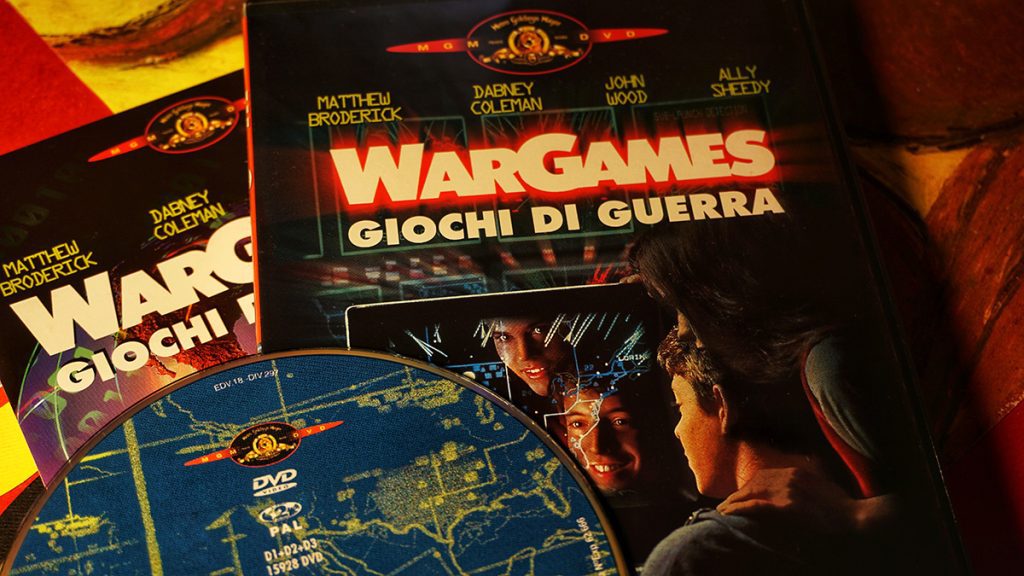
In the 1983 movie WarGames, a school kid triggers a potential nuclear war by hacking into America’s Strategic Air Command, mistaking it for a video game. This accidental gamification of war seems far-fetched, but today, as the Pentagon explores weaponising language bots like ChatGPT, the line between fiction and reality blurs. The film’s relevance serves as a cautionary tale, raising concerns about the potential misuse of AI and the need for regulation.
A little dose of cheese, a big dollop of eighties zeitgeist and tech that looks like, well, you may have to zone out of the tech. Otherwise you’ll laugh throughout most of this movie. However, the overall film craft of this Cold War thriller is so good it’ll still, forty years later, have you on the edge of your seat.
John Badham’s WarGames, released exactly 40 years ago, is the story of a schoolkid who unwittingly hacks into America’s Strategic Air Command and brings the world right to the brink of nuclear war. He doesn’t know he’s doing this; he thinks he’s just lucked onto a brand new video game. The plot was inspired by a real military hacker, David Scott Lewis. You might say it’s about the accidental gamification of war.
Life Imitating Hollywood
So what makes it so prophetic? The Cold War is a thing of the past, despite Putin’s current outbreak of machismo. The firewalls in today’s military installations are absolutely impregnable (hackers, please don’t take this as a personal challenge). And apparently, games about throwing irritated birds at collapsible structures have more allure than games about thermonuclear conflict nowadays.
Well, popcorn yourself though the fun, the tension and the great storytelling. But then strap yourself in for the last twenty minutes. Because the ride you’re about to be taken on could be the very reason why the CEO of OpenAI, Sam Altman, urged the US government to regulate language bots like ChatGPT, during a hearing on AI in congress a few weeks ago.
The plot line of WarGames centres around a computer, designed to analyse all scenarios related to nuclear attack. It has mistakenly been instructed to initiate a first strike by a kid playing on his computer, in his bedroom in Seattle. The computer, dubbed Whopper because of its acronym WOPR, is linked to all command protocols – it has to be, otherwise its analysis would be compromised. So it locks out human intervention because as far as it’s concerned the button pushers might all have been vaporised. Whopper begins the launch sequence for about 2,000 nuclear ICBMs.
What happens next really is the gamification of war, though a terrifying display of the potential of human intelligence matching the potential of human stupidity. No spoiler alerts, just use your imagination.
You may feel that the link between nuclear holocaust and ChatGPT is something of a stretch.
The Military and ChatGPT
Well, you may wish to revisit that feeling. Because the Pentagon feels otherwise and sees a very real way to weaponise language bots, under the guise of strategic enablement and ‘defence’ capabilities. Oh dear, a language bot trusted to analyse nuclear capabilities and then recommend a perfect pre-emptive ‘can’t lose’ strike. Or analysing a snapcount (response) scenario which takes into consideration the possibility of no human being around to initiate launch.
Imagine. An app being a weapon of mass destruction.
Inside Telecom has already had a go at ChatGPT for legitimising plagiarism. And we’re currently studying the use of it in financial markets and its misuse in recruitment. So what’s next? The algorithms are there. The data collection is there. Developers are already bragging about forthcoming apps with 10, 20,100 times the capability of ChatGPT. The world is in an unhappy frame of mind geopolitically, with a number of players rattling some rather radioactive sabres.
If your skin isn’t crawling by now at this gamification of war, consider that you don’t even need 2000 nuclear warheads to obliterate the world any more. According to the alarmingly accurate military analyst turned writer Tom Clancy, you just need one.
Have a nice day.
Inside Telecom provides you with an extensive list of content covering all aspects of the tech industry. Keep an eye on our Opinion to stay informed and up-to-date with our daily articles.